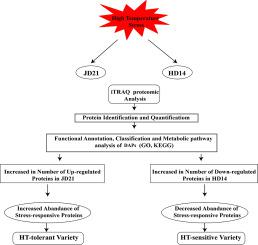Journal of Proteomics ( IF 2.8 ) Pub Date : 2020-09-07 , DOI: 10.1016/j.jprot.2020.103968 Jiajia Li 1 , Muhammad Nadeem 1 , Linying Chen 1 , Minghua Wang 1 , Mingyue Wan 1 , Lijuan Qiu 2 , Xiaobo Wang 1

|
High-temperature has severe impacts on the functionality and development of soybean male reproductive organs. However, the molecular mechanism of thermo-tolerance in soybean remains unclear. In this study, a differential proteomic analysis was conducted between the anthers of heat-tolerant (JD21) and heat-sensitive (HD14) cultivars using an iTRAQ based approach. In total, 371, 479, and 417 differentially abundant proteins were identified between HD14 anthers treated with high-temperature stress vs HD14 anthers in the natural field conditions, JD21 anthers treated with high-temperature stress vs JD21 anthers in the natural field conditions, and HD14 vs JD21 anthers treated with high-temperature stress, respectively. The differentially abundant proteins associated with thermo-tolerance were predominantly involved in carbohydrate and energy metabolism, protein synthesis and degradation, nitrogen assimilation, and ROS detoxification. Sixteen common differentially abundant proteins were involved in known protein-protein interaction networks in three comparisons associated with heat, which may strongly influence anther growth and development. The qRT-PCR analysis validated the reliability of the iTRAQ results. In conclusion, the heat-tolerant cultivar performed better under stress than heat-sensitive cultivar through modulation of HSP family proteins, pectinesterase, profilin, S-adenosylmethionine synthase, peroxidase, GST, peptidylprolyl isomerase, and disulfide-isomerase. The results provide novel insight into the mechanism of high-temperature stress response of soybean.
Significance
In recent years, with the high temperature (HT) stress brought by climate change frequently occurs at anthesis and negatively affects soybean productivity. The molecular mechanism underlying the response of soybean anthers to HT is a relatively complex process and thus difficult to elucidate; however, it is possible to identify differentially expressed genes or proteins between heat-sensitive and heat-tolerant cultivars under HT stress. The potential candidate genes or proteins may then be utilized in elucidating the molecular mechanism underlying the response of soybean to HT stress, as well as provide genetic resource for the improvement of heat-tolerant characteristics in soybean. In present study, quantitative and qualitative proteomic changes occurring in anthers were compared between the heat-tolerant (JD21) and heat-sensitive (HD14) cultivars under HT stress using iTRAQ-based proteomics strategy. Our results provide new insight into translational alterations in HT-resistant and HT-sensitive soybean cultivars under HT stress, which helps to address the underlying molecular mechanism of soybean in response to HT stress.
中文翻译:

高温胁迫下通过 iTRAQ 对大豆花药进行差异蛋白质组分析。
高温严重影响大豆雄性生殖器官的功能和发育。然而,大豆耐热性的分子机制仍不清楚。在本研究中,使用基于 iTRAQ 的方法在耐热 (JD21) 和热敏感 (HD14) 品种的花药之间进行了差异蛋白质组分析。总共,在经高温胁迫处理的 HD14 花药与自然田间条件下的 HD14 花药、经高温胁迫处理的 JD21 花药与自然田间条件下的 JD21 花药之间鉴定出 371、479 和 417 个差异丰富的蛋白质,以及HD14 与 JD21 花药分别经过高温胁迫处理。与耐热性相关的差异丰度蛋白质主要涉及碳水化合物和能量代谢、蛋白质合成和降解、氮同化和ROS解毒。在与热相关的三个比较中,已知的蛋白质-蛋白质相互作用网络涉及十六种常见的差异丰度蛋白质,这可能强烈影响花药的生长和发育。 qRT-PCR 分析验证了 iTRAQ 结果的可靠性。总之,通过调节HSP家族蛋白、果胶酯酶、Profilin、S-腺苷甲硫氨酸合酶、过氧化物酶、GST、肽基脯氨酰异构酶和二硫键异构酶,耐热品种在胁迫下比热敏感品种表现更好。该结果为大豆高温胁迫反应机制提供了新的见解。
意义
近年来,气候变化带来的高温胁迫频繁发生在大豆开花期,对大豆产量造成负面影响。大豆花药对HT反应的分子机制是一个相对复杂的过程,因此难以阐明;然而,在高温胁迫下,可以鉴定热敏感品种和耐热品种之间差异表达的基因或蛋白质。潜在的候选基因或蛋白质可用于阐明大豆对高温胁迫响应的分子机制,并为大豆耐热性状的改良提供遗传资源。在本研究中,使用基于 iTRAQ 的蛋白质组学策略,比较了高温胁迫下耐热品种 (JD21) 和热敏感品种 (HD14) 花药中发生的定量和定性蛋白质组变化。我们的研究结果为高温抗性和高温敏感大豆品种在高温胁迫下的翻译改变提供了新的见解,这有助于解决大豆响应高温胁迫的潜在分子机制。











































 京公网安备 11010802027423号
京公网安备 11010802027423号